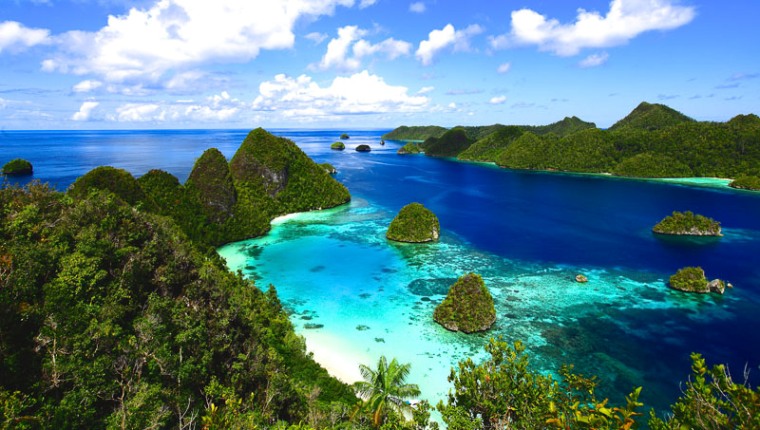Asia
Backpacking Indonesia Need To Know
Basics
Language:
Capital:
Currency:
|
Dial Code:
International Access Code:
Emergency Services Number:
Time Difference:
|
Places To Visit In Indonesia
Raja Ampat is a breathtaking and remote collection of 1,500 islands, cays, and shoals.
Raja Ampat has some of the best diving and snorkel spots in the world.
Next…
Entry
Most overseas nationals need a visa to enter Indonesia. You can get a 30-day visa on arrival at a cost of US$35, valid up to 30 days. You can extend this type of visa once for a maximum of 30 days by applying to an Immigration office within Indonesia.
You will need a permit to travel to Papua and West Papua.
Your passport should be valid for a minimum period of 6 months from the date of departure from Indonesia.
Yellow fever vaccination is required for travellers arriving from countries with risk of yellow fever transmission.
Overstaying without the proper authority is a serious matter and visitors can be held in detention or refused permission to leave the country until a fine of 200,000 IDR per day is paid. After overstaying for 60 days, you will be detained and possibly imprisoned.
For official information visit your home government travel bureau or an Indonesian Embassy.
Getting Around
Only book taxis with a reputable firm. You can ask your hotel to book one for you, or use taxis from Bluebird, Silverbird or Express groups. Beware of unlicensed taxis, that try to look like reputable firms.
With the exception of Garuda Airlines, Mandala Airlines, Airfast, Ekspres Transportasi Antarbenua (operating as PremiAir) and Indonesia Air Asia, all other Indonesian passenger airlines are refused permission to operate services to the EU because of safety concerns.
More detail is to come in this section, but you can read about general advice regarding Getting Around When You Get There
Accommodation
Indonesia has a wide variety of hostels and you should never have any problem finding one.
The average price of a hostel is 76,000-152,000 IDR (£4-£8) a night.
The majority of hostels in Indonesia will provide linen and bathroom facilities. Usually there will be internet facilities as well as a common area and laundry services.
Hotels and guesthouses are cheap, especially if there is more than one of you.
If you stay in private accommodation in Indonesia (i.e. not a hostel or hotel) you must register your presence with the local police or you could face a fine of 5 million IDR.
Read more about Accommodation When You Get There and Living in Hostels
Recommended For Further Information
If you are heading to multiple destinations in South East Asia I highly recommend picking up a copy of Lonely Planet’s; Southeast Asia On A Shoestring. It provides the most relevant, up-to-date advice on what to see and skip, where to stay, and how to optimise your budget for an extended continental trip…

Food And Health
Restaurants are cheap and cooking facilities in hostels are rare.
Food hygiene and safety is improving, but isn’t up to Western standards. Use your instincts; if the place looks dirty, don’t eat there; if your food isn’t piping hot, don’t eat it.
Water is not safe to drink – always buy bottled or boil.
The standard of local medical care can be poor and some medical tests can’t be done reliably. Good medical care can be very expensive and in remote areas attention for serious injuries or illness is likely to be unavailable. Make sure you have adequate travel health insurance and accessible funds to cover the cost of any medical treatment abroad and repatriation.
Dengue Fever and Malaria are present in Indonesia. Always contact your GP around 8 weeks before your trip to check whether you need any vaccinations or other preventive measures. Visit here for Recommended Vaccinations and read here for more about Travelling Health In General
Weather & Time To Go
Indonesia is always hot and humid, with wet and dry seasons. The rainy season is usually from around October to April.
Communications
Internet and wifi is widespread and accessible in most hostels and hotels. International calling cards are also cheaply available.
Dangers And Considerations
You should exercise caution when travelling to Aceh, Central Sulawesi Province (especially Palu, Poso and Tentena), Maluku Province (especially Ambon), Papua and West Papua Province due to potential for violence or violent conflict.
There is a high threat from terrorism, so be vigilant.
Thieves, pickpockets and scam artists commonly operate in tourist areas and cities, particularly in Bali. Pickpockets often work in gangs, some distracting you while the others go into your bags, so be alert and try not to get distracted around tourist attractions and cash points.
Credit card fraud is common. Don’t lose sight of your card during transactions.
Drink spiking is common – buy your own drinks and keep them within sight at all times. There have been a number of deaths and cases of serious illness of locals and foreigners in Indonesia caused by drinking alcoholic drinks contaminated with methanol. Take extreme care when purchasing spirit-based drinks, as bottles may appear to be genuine when they are not, and seek advice from your hostel on where to buy from.
Don’t get involved with illegal drugs. Possession, trafficking and manufacture of any illegal drugs are serious offences in Indonesia. The Indonesian authorities have a zero-tolerance policy and those caught face lengthy prison sentences or the death penalty.
Stray dogs are common throughout Indonesia. The vast majority are harmless, but some may be rabid. Avoid dogs, don’t pet or feed them, no matter how cute. Never run from them as this will encourage them to attack. Rabies is 100% fatal once symptoms develop, but symptoms are 100% preventable if you act immediately. If bitten by any dog or mammal in Indonesia wash the wound thoroughly with soap and visit a health professional for post exposure vaccinations.
Indonesia sits along a volatile seismic strip called the ‘Ring of Fire’ in the Pacific. Volcanic eruptions and earthquakes occur regularly, which can present a potential threat of tsunamis. Familiarise yourself with safety procedures, and in the event of a natural disaster you should follow the instructions of local authorities.
Carry a photocopy of the relevant pages of your passport and copy of your arrival card for identification purposes and keep the original documents in a safe place.
Dangers constantly change. Always check with your foreign office (British Foreign Office webpage) or travel advice bureau for the latest information regarding your destinations safety.
Read more about Safety And Security here
Respecting Culture
Indonesia is a predominately Muslim country, you should respect local traditions, customs, laws and religions at all times and be aware of your actions to ensure that they do not offend.
During Balinese New Year (around February/ March), known as Nyepi, local custom requires that all people in Bali observe a day of silence by staying indoors, turning off lights, and making no noise. Ngurah Rai International Airport is closed for the entire day.
Getting angry or losing your cool is a sign of weakness and therefore is extremely counter-productive.
Using your left hand is considered very rude, this is especially true when you are shaking hands or handing something to someone.
You should remove shoes before entering a home or religious site.























